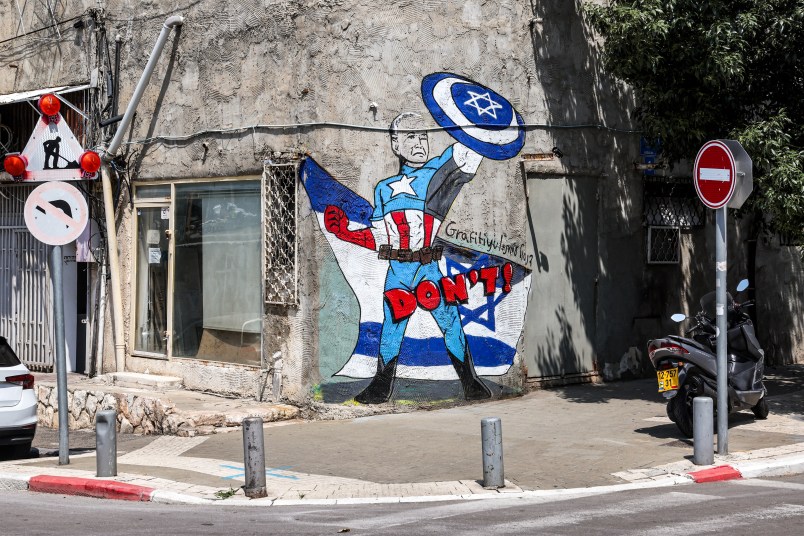What did the 9/11 Commission actually say about Iraq-al Qaeda connections? And what did the Bush administration actually say about them? An e-mail sent out from the White House Office of Public Liaison titled, “TALKING POINTS: 9-11 Commission Staff Report Confirmes Administration’s Views of al-Qaeda/Iraq Ties” claims:
<$NoAd$>A 9-11 Commission staff report supports the Bush Administration’s longstanding conclusion that there was no evidence of “collaboration” between al-Qaeda on the 9-11 attacks against the United States. The Administration has never suggested that Iraq “collaborated” or “cooperated” with al-Qaeda to carry out the 9-11 attacks.
And indeed, as the, uh, talking points memo notes, President Bush stated that “We’ve had no evidence that Saddam Hussein was involved with … September 11th.” Of course, what the memo quickly adds is that he said that on September 17, 2003. And what it leaves out entirely is why he said that on September 17, 2003. It was in response to this:
MR. RUSSERT: The Washington Post asked the American people about Saddam Hussein, and this is what they said: 69 percent said he was involved in the September 11 attacks. Are you surprised by that?
VICE PRES. CHENEY: No. I think itâs not surprising that people make that connection.
MR. RUSSERT: But is there a connection?
VICE PRES. CHENEY: We donât know. You and I talked about this two years ago. I can remember you asking me this question just a few days after the original attack. At the time I said no, we didnât have any evidence of that. Subsequent to that, weâve learned a couple of things. We learned more and more that there was a relationship between Iraq and al-Qaeda that stretched back through most of the decade of the â90s, that it involved training, for example, on BW and CW, that al-Qaeda sent personnel to Baghdad to get trained on the systems that are involved. The Iraqis providing bomb-making expertise and advice to the al-Qaeda organization.
We know, for example, in connection with the original World Trade Center bombing in â93 that one of the bombers was Iraqi, returned to Iraq after the attack of â93. And weâve learned subsequent to that, since we went into Baghdad and got into the intelligence files, that this individual probably also received financing from the Iraqi government as well as safe haven.
Now, is there a connection between the Iraqi government and the original World Trade Center bombing in â93? We know, as I say, that one of the perpetrators of that act did, in fact, receive support from the Iraqi government after the fact. With respect to 9/11, of course, weâve had the story thatâs been public out there. The Czechs alleged that Mohamed Atta, the lead attacker, met in Prague with a senior Iraqi intelligence official five months before the attack, but weâve never been able to develop anymore of that yet either in terms of confirming it or discrediting it. We just donât know.
Despite not having a shred of evidence, Dick Cheney not only floated the prospect of Saddam sponsoring 9/11, but Saddam being behind the 1993 World Trade Center attacks–which Paul Wolfowitz also referenced on Good Morning America for the second anniversary of 9/11. (Hey Dick: Let’s see the evidence on that one, too.) The ensuing media outrage at this blatant dishonesty was what prompted Bush to set the record straight(er).
Let’s not stop there. The White House memo continues:
The Administration has said, however, that it was worried about a number of contacts between Iraq and al-Qaeda, including contacts between senior Iraqi intelligence officers and senior members of al-Qaeda.
This is what the 9/11 Commission actually said:
A senior Iraqi intelligence officer reportedly made three visits to Sudan, finally meeting Bin Laden in 1994. Bin Laden is said to have requested space to establish training camps, as well as assistance in procuring weapons, but Iraq apparently never responded. There have been reports that contacts between Iraq and Al Qaeda also occurred after Bin Laden returned to Afghanistan, but they do not appear to have resulted in a collaborative relationship. Two senior Bin Laden associates have adamantly denied that any ties existed between Al Qaeda and Iraq. [Emphasis added]
So for the White House memo to be conveying truthful information, the Bush administration would need to have followed up any references to “contacts between Iraq and al-Qaeda” with reminders that the intelligence community saw no indication that those contacts were fruitful–and that in some cases entreaties were apparently rebuffed. Did they say that?
On October 7, 2002, in a televised, primetime speech on the threat from Iraq, President Bush said:
We know that Iraq and al Qaeda have had high-level contacts that go back a decade. Some al Qaeda leaders who fled Afghanistan went to Iraq. These include one very senior al Qaeda leader who received medical treatment in Baghdad this year, and who has been associated with planning for chemical and biological attacks. We’ve learned that Iraq has trained al Qaeda members in bomb-making and poisons and deadly gases. And we know that after September the 11th, Saddam Hussein’s regime gleefully celebrated the terrorist attacks on America. Iraq could decide on any given day to provide a biological or chemical weapon to a terrorist group or individual terrorists.
Two weeks earlier, in a press conference with Colombian President Alvaro Uribe he said:
The war on terror, you can’t distinguish between al Qaeda and Saddam when you talk about the war on terror.
Any given day. You can’t distinguish between al-Qaeda and Saddam. (For more administration assertions of the dubious link between Iraq and al-Qaeda, check out the IRAQ’D mixtape sweepstakes.) If the American people mistakenly think Saddam is tied to 9/11, it’s not surprising. On that count, I think I agree with Dick Cheney.





